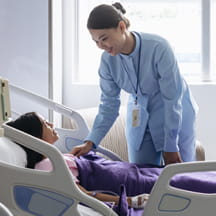Program Gives Adult Nurses Confidence with Pediatric Patients
Years ago, Debra Cryder, assistant nurse manager, walked onto the floor of the adult intensive care unit (ICU) at UC Davis Medical Center. She saw that she had two children in her care, 8 and 9-year-old boys. "This was before my pediatric training," Cryder says. "I was an adult nurse. I had three girls at home and knew nothing about boys. I thought ‘Oh, my goodness, this is going to be a challenge."
As the shift wore on, she worked to earn the boys' trust. She felt like they came to like her; she made them smile. She realized she could provide them safe care without causing harm. "It was one of the most satisfying shifts I've ever had," Cryder says. "I always carry that with me because once you hit these things head on, usually you can find a lot of joy."
PICU overflow
In 1992, UC Davis opened the eight-bed adult ICU, which Cryder still works on today, and a 10-bed pediatric intensive care unit (PICU). Because the units were close together on the same floor, and both new, the adult ICU became the overflow for the PICU's stable, older patients when they needed space during busy times, such as with traumas in the summer.
"They were nearby, and they could keep a close eye on the patients," says Cryder. "We were in close enough proximity that it felt safe enough that we could do that."
In 2011, the PICU unit moved to a new, 24-bed unit. "We thought we'd never see a PICU patient again," Cryder says. "Well, we are bursting at the seams, and again we were put in the position a few years ago for the overflow from PICU."
This time, the PICU unit was several floors away and a building over, making it harder for the pediatric nurses to provide them the same level of support they had when the units were closer together.
Building confidence through education
As a leader on the floor, Cryder was facing a staff of nurses who felt unprepared to care for the new patient population. She and Gina Mumper, nurse manager for the adult ICU, began listening to nurses' concerns and sharing that feedback with their colleagues leading the Pediatric Education Foundation, a blended learning education program, which included Pediatric Learning Solutions online courses and in-person classes.
"We were facing the fear of the unknown and that nurses never want to cause harm to a patient. They didn't feel qualified," says Cryder. "Our situation was two-fold. We needed some education, but more than that, we needed to boost the confidence of very competent nurses."
In addition to concerns regarding patient care, the nurses were having to adjust to a different communication approach at the bedside.
"If there's family input with an adult patient, generally speaking, we understand what needs to be done, and there's not a lot of consideration," says Cryder. "But for a family with a chronic child, they care for 24/7 at home, we need to respect their input and listen closely to them. So that approach is different from adults."
The value of a liaison
To fill the gap resulting from the increased distance between the units, Michelle Linenberger, pediatric professional development specialist and leader of the Pediatric Education Foundation, served as a liaison.
"Michelle has been instrumental in helping us bridge to the type of excellence I believe we provide our patients now," says Cryder. "She is always checking on us. She talks to nurses every time we take care of a patient, making sure we're comfortable and don't have any questions."
Linenberger rounded on the unit at least once a day if there was a PICU patient present, taking some of the mentoring pressure off of Cryder and Mumper. "It's different having us support them versus having an actual pediatric nurse supporting them," says Cryder.
Beyond the basics
With the knowledge and support they gained through the Foundation, Cryder says she and the other adult ICU nurses have been able to focus on a different aspect of pediatric patient care. "They're just so fresh and innocent. Just trying to be able to connect with them is an experience. And when you do, it's a beautiful thing."
About PLS
Pediatric Learning Solutions’ online education provides the foundational knowledge clinicians need to master the competencies and skills for safe and effective patient care.


